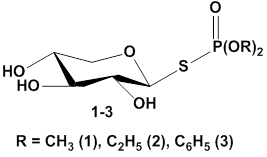
THIOPHOSPHATE DERIVATIVES OF XYLOSE: PREPARATION AND INSECTICIDAL ACTIVITY
2Saint-Petersburg State Institute of Technology (Technical University), Laboratory of Molecular Pharmacology, Saint-Petersburg
3Microbiological Plant Protection Laboratory, All-Russian Institute of Plant Protection, Saint-Petersburg
Organophosphorus pesticides (OP) are widely applied in agriculture and regarded as one of the most important group of pesticides. Nowadays, more than 200 OP, which belong to various groups of organophosphorus compounds, are widely used in agriculture and, in particularly, thiophosphate and thiophosphonate derivatives are the most effective fungicides and insecticides. A great interest in OP can be explained by the fact that most of these compounds are easily destroyed in the soil, forming phosphorous acid and other simple substances and almost don’t leave any poisonous residues in the environment. Nevertheless, carbohydrates, and namely, organophosphorus mono-saccharides, are completely absent in the assortment of chemical means of plant protection. In this view, we have synthesized a new group of thiophosphate derivatives of xylose (1-3) and tested their insecticidal activity against plant phytopathogens.

Biological studies indicated that thiophosphate derivatives of xylose (1-3) possessed high insecticidal activity against sucking insects. As a test-subject, a wick aphid Megoura viciae Buckt was used. It was found that compound 1 caused mortality of 90% of Megoura viciae Buckt in concentration of 0.1% after 2 h. Compounds 1-3 showed high insecticidal activity with the same concentration, while as wick aphid’s mortality constituted 100% after 6-24 h. Compounds 1-3 indicated high insecticidal action in concentration of 0.05% and wick aphid’s mortality of 100% after 6-24 h.
It is worthwhile stressing out, that search of new pesticides among mono-saccharides is a promising direction if we take into account that experiments should be widened in order to study other kinds of pesticidal activity, and also to test their action as growth plant regulators.

Powered by Eventact EMS